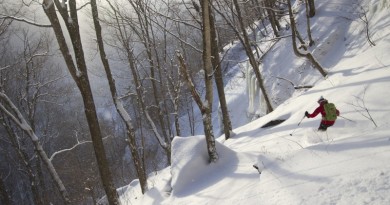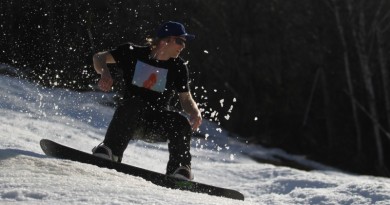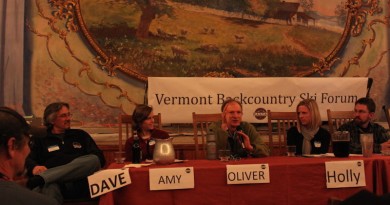One of Them Vermont Winters
We love to reflect upon past Vermont winters, abundant with snow. But is winter today so different? Gregory Dennis explains.
By Gregory Dennis
There’s an old story about the Vermont farmer who had his farm in the Connecticut River Valley.
Over the years, the river had changed course several times and eventually, out-of-state surveyors were hired to determine exactly where the state line was.
When their work was completed, it fell to one of the surveyors to tell the old Vermont farmer that his land was in fact not in Vermont, but was actually in New Hampshire.
“I’m mighty glad to hear that!” the farmer said.
Even though the surveyor was a flatlander, he recognized this was quite an unusual show of ebullience from the normally taciturn farmer.
“Why is that?” he asked the farmer.
“Well,” the farmer replied, “I don’t think I coulda stood another one of them Vermont winters.”
Recalling that story got me wondering: Are we having another one of them Vermont winters? Is this actually– despite climate change on our warming planet – an old-fashioned testicle freezer?
For perspective on the icy whiteness that has enveloped us, I turned to Mark Breen. He’s been doing the Fairbanks Museum’s “Eye on the Sky” weather reports on Vermont Public radio for the past 33 years.
That in turn carries on a tradition started by VPR’s original president, Ray Dilley.
Dilley wanted VPR to have its own Vermont weather report, so he retained Fred Mold, who was the director of the museum. Mold had been doing weather on what was then WTWN, the St. Johnsbury radio station.
His reports were the continuation of a long Fairbanks Museum tradition dating to its founder, Franklin Fairbanks, whose personal weather records extended back to the 1850s.
Breen and his “Eye on the Sky” cohorts Steve Maleski and Lawrence Hayes provide not just forecasts, but also background on what’s influencing Vermont’s ever-changing weather.
“There is a tendency among some media outlets to just go bonkers about events that are well within the range of normal weather,” Breen told me. “Fortunately, VPR gives us time to put things in perspective.”
I remarked to him that this winter reminds me of the storied winters of my adolescence and young adulthood in Vermont. Back then, winter was consistently cold and white (and we had to walk to school uphill both ways).
It turns out, though, that’s just an accident of timing.
Many Vermont winters in the 1960s and 1970s were, in Breen’s words, “exceptional. There were four winters in a row that were well above average in snowfall and cold, between 1968 and 1972. There’s been no other four-year period like that in the past 100 years. That has definitely colored people’s perceptions of what winter is like in Vermont.”
Even talking about “Vermont weather” as a whole can be misleading. That’s because much of it has a distinctly local factor.
Southern Vermont is greatly influenced by storms off the Atlantic – the monsters that have been pounding Boston for the past month, for example. The Champlain Valley, on the other hand, draws much of its snowfall from weather off the Great Lakes, blown here by the prevailing westerly winds.
Those westerlies often mean the Champlain Valley misses much of the snowfall. When storms come off the Adirondacks, the air drops down into the valley. Sinking air tends to dry out and therefore deliver less precipitation.
Rising back up the Green Mountains, the winds drop more snow on places like Lincoln and Hancock.
But when the wind turns to the north, winter weather from Canada tends to bring more snow to our valley.
I mused to Mark Breen that trying to predict the direction of the wind in specific parts of the state must be pretty challenging. “It’s what makes it fun,” he replied.
What about climate change, I asked him. Hasn’t that made our winters much less snowy?
“There is no question that our temperatures have warmed up,” he said. “But most of that warming took place before 1950. Since 1950, the temperatures have continued to rise in Vermont, but not as quickly.”
Ski areas these days rightly worry that the Green Mountains are less likely to be white in winter. But historically, at least, snowfall in Vermont has generally been on the rise.
In 1950, Breen notes, the average annual snowfall in St. Johnsbury was 78 inches. Now it averages 94 inches a year.
So what’s going on?
“A lot of things are cyclical in terms of climate,” he said. “Climate has a tendency to go back and forth.” Plus warming prompts more precipitation.
It’s anybody’s guess what winter will be like in the next few years. But Breen says the weather pattern of the next few decades is as likely to be influenced by the oceans and sun cycles as they are by human activity linked to climate change.
He notes, for example, that “the sun has been unusually inactive” in recent years and therefore less of an influence than it typically is.
And even with the climate getting warmer, the skiing has been absolutely stupendous for the past month.
So is this winter a throwback to the old cold snowy days?
While this has not been unusually snowy winter, it has in fact been a chillier one.
Cornwall, which lies in the heart of Addison County’s apple orchards and farm country in the Champlain Valley, has been 15° colder than normal this month – a statistic drawn in part from Cornwall weather records that date back to the 1890s.
Breen says this has been one of the coldest Vermont February’s on record – nowhere near as cold as the nadir of February 1934, but certainly the coldest since 1994.
So what’s a Vermonter to do in the face of all this cold?
Nature lovers will tell you there’s no such thing as bad weather – only poor choice of clothing.
Charles Dudley Warner famously remarked that everybody talks about the weather, but nobody does anything about it.
So I guess we’ll just have to bundle up, and wait until it warms up. Or, if you’re lucky enough to be a skier, get out there and enjoy it.
– Gregory Dennis’s column appears regularly in the Addison County Independent, and is archived on his blog, at www.GregoryDennis.WordPress.com. Email: gregdennisvt@yahoo.com. Twitter: @greengregdennis.



